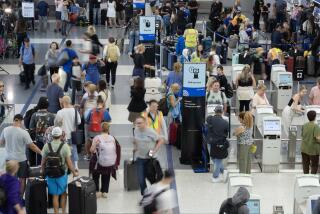Get Used to It: Our Airports Are Vulnerable to Terrorism
- Share via
As we contemplate new measures to expand airport security, we need to keep in mind some unfortunate realities made clear by the July 4 shootings at Los Angeles International Airport.
First reality: It is very hard to protect public places. Doing so is costly and disruptive and creates new vulnerabilities.
Second reality: It is a mistake to create expectations about invulnerability that cannot be fulfilled. We could never make all locations invulnerable to attack. A determined killer could always move down the road to other public places.
We must make a distinction between security at airports and security for airports. There is justification to take extraordinary security measures at airports, but the calculations change when we talk about security for airports.
What we have now is security at airports deployed to keep weapons off airplanes. We do this because terrorists have focused their attacks on commercial airliners as national symbols. Airline sabotage can claim the lives of hundreds of passengers in a single incident. And, as we saw on Sept. 11, a hijacked plane can be turned into a missile that can kill thousands in a city below.
But the airport terminal itself is public space. Outside of the screening points, it is no safer or no more dangerous than most other public spaces.
Where do we draw the line? The government has publicized possible terrorist threats to national monuments, nuclear reactors, surface transportation, ports, power plants, bridges, high-rise buildings, movie studios, sports arenas, shopping malls and public celebrations. Can we protect them all? And would even extreme measures stop attackers from taking innocent lives? A determined killer will always find a target. Someone determined to kill Jews will find it no more difficult than killing Catholics, Muslims, Buddhists, Hindus or members of any other religious, ethnic or national group.
Does anyone really believe that if airport security had been tighter, the shooter at LAX would have traded his pistols for a picket sign and protested peacefully against Israel?
Security at Israel’s main airport has been tight ever since May 1972, when three members of the Japanese Red Army--which had allied itself with the Popular Front for the Liberation of Palestine--attacked arriving passengers. Even Israeli officials concede the difficulties of preventing attacks like the one at LAX.
Because Israel’s Ben Gurion Airport is surrounded by rings of security, suicide attackers instead target bus stops, shopping malls, hotel lobbies and pizza parlors. The horror of these murders is not lessened by their distance from the airport.
Better security for airports is no small undertaking. The deployment of even a few additional armed uniformed and undercover officers at every terminal in every airport easily would involve thousands of new security personnel. Shifting the screening checkpoints to the front of the terminal would simply create long lines of passengers on the sidewalks outside--a new vulnerability and a tempting target for killers.
The question is not whether we can increase security for any category of public real estate. If we are willing to make the necessary investment and accept the added inconvenience, we can make it more difficult (but by no means impossible) to carry out an act of violence inside wherever we establish the perimeter. The question is: How can we best allocate limited resources to reduce dangers to public safety overall?
All this doesn’t mean we should do nothing more at our airports. We can on a random basis deploy additional police without pretending to provide full coverage. We can deploy additional surveillance cameras. And we can increase the efficiency of the check-in and screening process to move passengers into the secure zone more quickly, thus reducing crowds and individual exposure.
Existing proposals to remodel airports or disperse check-in facilities to satellite terminals will provide valuable opportunities to explore new security protocols, but these are long-term improvements.
With hard work, good luck and clever strategies we may be able to come close to abolishing murder in the skies. But no society in history has been able to abolish murder here on Earth, and none ever will. Unfortunately, there is no security device that can X-ray people’s souls to identify the killers among us.
More to Read
Sign up for Essential California
The most important California stories and recommendations in your inbox every morning.
You may occasionally receive promotional content from the Los Angeles Times.













